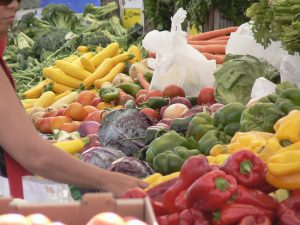
The carotenoids found in fruits and vegetables help fight free radicals, which can lead to breast cancer.
Once again, medical researchers are proving your mother right: you really should eat your vegetables. A study published in the December issue of the Journal of the National Cancer Institute shows, quite clearly, that consuming fruits and vegetables high in carotenoids is linked with lower rates of breast cancer.
The study re-examined the results of eight previous trials that, overall, measured the carotenoid levels in the blood of nearly 8,000 women compared to the incidenceIncidence refers to the occurrence of new cases of disease or injury in a population over a specified period of time. of breast cancer. They found that women with higher levels of circulating carotenoids (that is, those women who ate more fruits & vegetables containing the compounds) had lower rates of breast cancer — especially the difficult-to-treat ER- forms of breast cancer that do not respond to estrogen-based hormoneA chemical substance produced in the body that controls and regulates the activity of certain cells or organs. therapy.
“The inverse associations we observed among ER-negative tumors highlight carotenoids as one of the first modifiable risk factorsAnything that increases or decreases a person’s chance of developing a disease. for this poor prognosisThe expected or likely outcome of a disease, usually based on a statistical analysis of large groups of patients. tumorA mass of cells that can be benign or malignant. type,” the study’s authors reported.
We always love to hear about positive, proactive ways women can improve their health and decrease their risk of breast cancer, and practicing good nutrition is something we’ve talked about in the past. But what are carotenoids exactly, and what should you be eating to gain their free radical-fighting benefits?
Simply put, carotenoids are the micronutrient compounds that give some fruits and vegetables their bright, vibrant colors. The most well-known carotenoid may be beta-carotene, the compound that gives carrots, pumpkin, and sweet potatoes their deep orange hue. Another popular carotenoid is lycopene, the proven antioxidant found in tomatoes, watermelon, red bell peppers, and papayas. Deeply colored leafy greens like kale and spinach are also rich in carotenoids.
Eating a wide variety of colors —think a rainbow of vegetables! — is the best way to ensure you are getting a good mix of the various carotenoids. Also, make sure you are consuming the appropriate serving size of your veggies.
See our collection of cancer-fighting recipes for inspiration to spice up the life of your vegetables, or share your favorite way to consume carotenoids below!